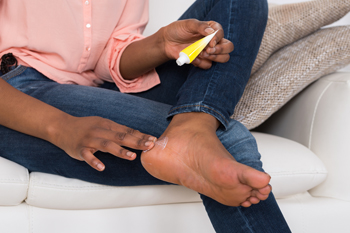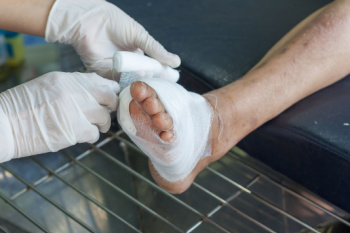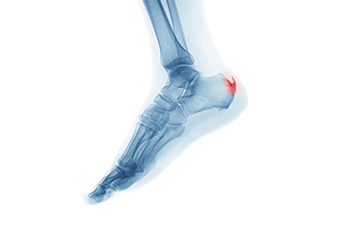Connect With Us
Blog
Items filtered by date: May 2024
Causes And Treatment Of Cracked Heels

Cracked heels often stem from various factors, including obesity, wearing ill-fitting shoes, prolonged standing, and dry skin. When the skin on your feet lacks moisture and becomes stiff, it is more susceptible to cracking, especially under pressure while standing or walking. Certain conditions, such as diabetes, psoriasis, and flat feet, can further dry out the skin and increase the risk of cracked heels or painful fissures. Preventative measures include moisturizing regularly, avoiding harsh soaps, and opting for closed-heeled shoes with ample cushioning. Wearing cotton socks can also help to reduce friction. Mild relief typically involves moisturizers containing ingredients like urea or hyaluronic acid, which help retain moisture and soften the skin. While mild cases can often be managed at home, it is important to see a podiatrist if heel cracks are associated with a medical condition or if they have become infected. Seeking professional advice ensures a proper diagnosis and treatment, leading to quicker healing and long-term foot health. If cracked and painful heels are causing you discomfort, it is suggested that you schedule an appointment with a podiatrist.
Cracked heels are unsightly and can cause further damage to your shoes and feet. If you have any concerns, contact Dr. Richard Silverstein from Union Foot Care. Our doctor can provide the care you need to keep you pain-free and on your feet.
Cracked Heels
Cracked heels appear unappealing and can make it harder for you walk around in sandals. Aside from looking unpleasant, cracked heels can also tear stockings, socks, and wear out your shoes. There are several methods to help restore a cracked heel and prevent further damage.
How Do You Get Them?
Dry skin is the number one culprit in creating cracked heels. Many athletes, walkers, joggers, and even swimmers suffer from cracked heels. Age and skin oil production play a role to getting cracked heels as well.
Promote Healing
Over the counter medicines can help, especially for those that need instant relief or who suffer from chronic dry feet.
Wear Socks – Wearing socks with medicated creams helps lock in moisture.
Moisturizers – Applying both day and night will help alleviate dryness which causes cracking.
Pumice Stones – These exfoliate and remove dead skin, which allows for smoother moisturizer application and better absorption into the skin.
Change in Diet
Eating healthy with a well-balanced diet will give the skin a fresh and radiant look. Your body responds to the kinds of food you ingest. Omega-3 fatty acids and zinc supplements can also revitalize skin tissue.
Most importantly, seek professional help if unsure how to proceed in treating cracked heels. A podiatrist will help you with any questions or information needed.
If you have any questions, please feel free to contact our office located in Havre de Grace, MD . We offer the newest diagnostic and treatment technologies for all your foot care needs.
The Prevalence of Foot Pain

Foot pain is a pervasive ailment affecting people of all ages and lifestyles. It manifests in various forms and can be felt anywhere in the foot, from the toes to the heel. Unfortunately, foot care is frequently neglected, leading to greater discomfort and potential complications. Foot discomfort is particularly pronounced among the elderly and women, which may be due to the aging process and footwear choices. The role of footwear cannot be overstated in the context of foot pain. Wearing ill-fitting shoes, high heels, or footwear with inadequate support can contribute significantly to discomfort and even chronic conditions like plantar fasciitis or bunions. Conversely, proper footwear selection, including supportive insoles or custom orthotics when necessary, can alleviate pressure points and promote overall foot health. If you suffer from persistent foot pain, it is suggested that you schedule an appointment with a podiatrist for a proper diagnosis and treatment.
Foot Pain
Foot pain can be extremely painful and debilitating. If you have a foot pain, consult with Dr. Richard Silverstein from Union Foot Care. Our doctor will assess your condition and provide you with quality foot and ankle treatment.
Causes
Foot pain is a very broad condition that could be caused by one or more ailments. The most common include:
- Bunions
- Hammertoes
- Plantar Fasciitis
- Bone Spurs
- Corns
- Tarsal Tunnel Syndrome
- Ingrown Toenails
- Arthritis (such as Gout, Rheumatoid, and Osteoarthritis)
- Flat Feet
- Injury (from stress fractures, broken toe, foot, ankle, Achilles tendon ruptures, and sprains)
- And more
Diagnosis
To figure out the cause of foot pain, podiatrists utilize several different methods. This can range from simple visual inspections and sensation tests to X-rays and MRI scans. Prior medical history, family medical history, and any recent physical traumatic events will all be taken into consideration for a proper diagnosis.
Treatment
Treatment depends upon the cause of the foot pain. Whether it is resting, staying off the foot, or having surgery; podiatrists have a number of treatment options available for foot pain.
If you have any questions, please feel free to contact our office located in Havre de Grace, MD . We offer the newest diagnostic and treatment technologies for all your foot care needs.
Diabetes and Foot Complications

Foot complications are prevalent in individuals with diabetes and can lead to severe consequences if left untreated. Neuropathy, or nerve damage, can result in loss of sensation, making it difficult to detect injuries or wounds. Skin changes, calluses, and foot ulcers are common due to reduced circulation and impaired healing. In severe cases, untreated ulcers can lead to infections, sometimes necessitating amputation. Preventive measures include daily foot inspections, wearing proper footwear, and regular podiatric care. If you have diabetes, it is strongly suggested that you include a podiatrist on your healthcare team. This medical professional can assess your foot health, provide education on foot care, and help manage possible complications.
Diabetic foot care is important in preventing foot ailments such as ulcers. If you are suffering from diabetes or have any other concerns about your feet, contact Dr. Richard Silverstein from Union Foot Care. Our doctor can provide the care you need to keep you pain-free and on your feet.
Diabetic Foot Care
Diabetes affects millions of people every year. The condition can damage blood vessels in many parts of the body, especially the feet. Because of this, taking care of your feet is essential if you have diabetes, and having a podiatrist help monitor your foot health is highly recommended.
The Importance of Caring for Your Feet
- Routinely inspect your feet for bruises or sores.
- Wear socks that fit your feet comfortably.
- Wear comfortable shoes that provide adequate support.
Patients with diabetes should have their doctor monitor their blood levels, as blood sugar levels play such a huge role in diabetic care. Monitoring these levels on a regular basis is highly advised.
It is always best to inform your healthcare professional of any concerns you may have regarding your feet, especially for diabetic patients. Early treatment and routine foot examinations are keys to maintaining proper health, especially because severe complications can arise if proper treatment is not applied.
If you have any questions please feel free to contact our office located in Havre de Grace, MD . We offer the newest diagnostic and treatment technologies for all your foot and ankle needs.
Why Live with Pain and Numbness in Your Feet?
Why Did I Develop a Heel Spur?

Heel spurs, bony protrusions that develop on the underside of the heel bone, can cause considerable pain and discomfort, making everyday activities such as walking or standing challenging. These spurs form in response to repeated strain or stress on the foot's ligaments and muscles, typically as a result of biomechanical issues or excessive pressure on the heel. Common contributing factors include wearing ill-fitting shoes, overuse during physical activities such as running or jumping, obesity, or having a flat or high arch. Additionally, age-related changes in foot structure and chronic conditions like plantar fasciitis or arthritis can increase the likelihood of heel spur development. While heel spurs may not always cause symptoms, they can exacerbate pain and inflammation in surrounding tissues, leading to discomfort and reduced mobility. A heel spur is treated by a podiatrist. If you have developed this condition, it is suggested that you consult this type of doctor who can accurately diagnose and treat heel spurs.
Heel spurs can be incredibly painful and sometimes may make you unable to participate in physical activities. To get medical care for your heel spurs, contact Dr. Richard Silverstein from Union Foot Care. Our doctor will do everything possible to treat your condition.
Heels Spurs
Heel spurs are formed by calcium deposits on the back of the foot where the heel is. This can also be caused by small fragments of bone breaking off one section of the foot, attaching onto the back of the foot. Heel spurs can also be bone growth on the back of the foot and may grow in the direction of the arch of the foot.
Older individuals usually suffer from heel spurs and pain sometimes intensifies with age. One of the main condition's spurs are related to is plantar fasciitis.
Pain
The pain associated with spurs is often because of weight placed on the feet. When someone is walking, their entire weight is concentrated on the feet. Bone spurs then have the tendency to affect other bones and tissues around the foot. As the pain continues, the feet will become tender and sensitive over time.
Treatments
There are many ways to treat heel spurs. If one is suffering from heel spurs in conjunction with pain, there are several methods for healing. Medication, surgery, and herbal care are some options.
If you have any questions feel free to contact our office located in Havre de Grace, MD . We offer the latest in diagnostic and treatment technology to meet your needs.
Blog Archives
- October 2024
- September 2024
- August 2024
- July 2024
- June 2024
- May 2024
- April 2024
- March 2024
- February 2024
- January 2024
- December 2023
- November 2023
- October 2023
- September 2023
- August 2023
- July 2023
- June 2023
- May 2023
- April 2023
- March 2023
- February 2023
- January 2023
- December 2022
- November 2022
- October 2022
- September 2022
- August 2022
- July 2022
- June 2022
- May 2022
- April 2022
- March 2022
- February 2022
- January 2022
- December 2021
- November 2021
- October 2021
- September 2021
- August 2021
- July 2021
- June 2021
- May 2021
- April 2021
- March 2021
- February 2021
- January 2021
- December 2020
- November 2020
- October 2020
- September 2020
- August 2020
- July 2020
- June 2020
- May 2020
- April 2020
- March 2020
- February 2020
- January 2020
- December 2019
- November 2019
- October 2019
- September 2019
- August 2019
- July 2019
- June 2019
- May 2019
- April 2019
- March 2019
- February 2019
- January 2019
- December 2018
- November 2018
- October 2018
- September 2018
- August 2018
- July 2018
- June 2018
- May 2018
- April 2018
- March 2018
- February 2018
- January 2018
- December 2017
- November 2017
- October 2017
- September 2017
- August 2017
- July 2017
- June 2017
- May 2017
- April 2017
- March 2017
- February 2017
- January 2017
- December 2016
- November 2016
- October 2016
- September 2016
- August 2016
- July 2016
- June 2016
- May 2016

